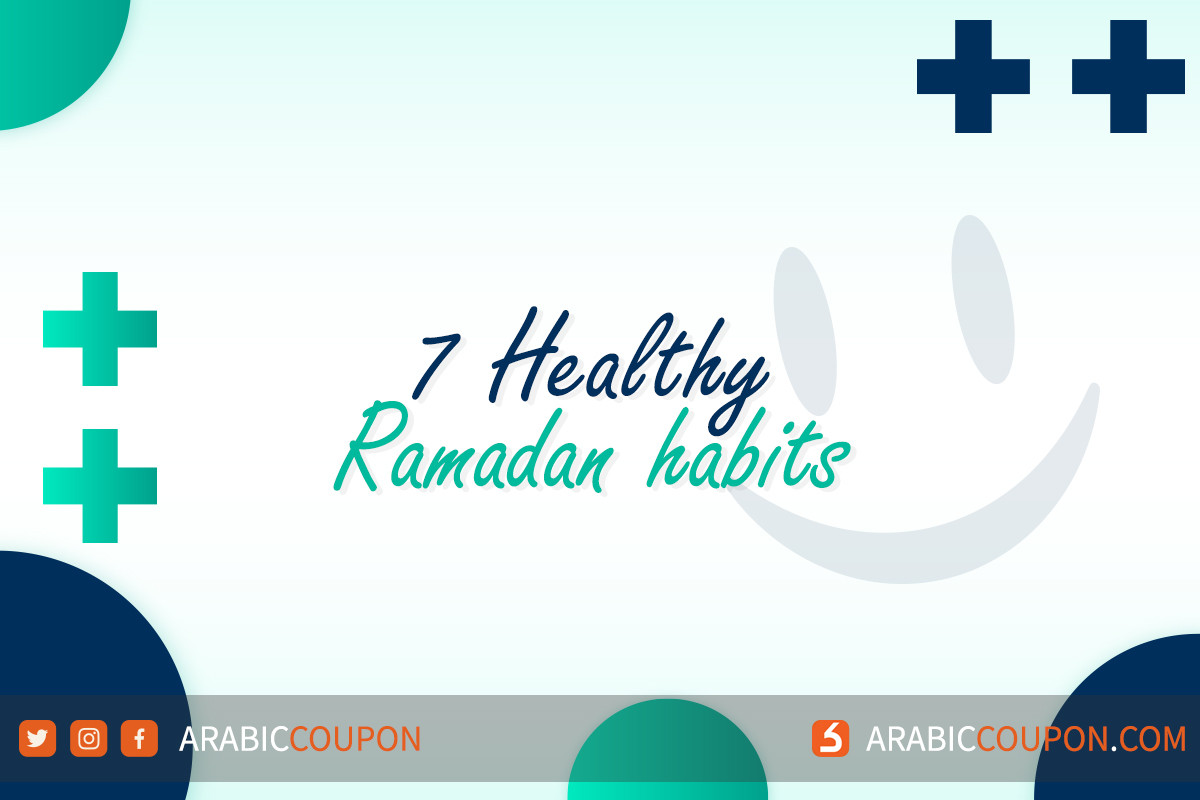7 Healthy Ramadan habits

The blessed month of Ramadan has approached and with it some wrong health practices that some have unfortunately acquired from the routine they are accustomed to in their lives, such as staying up late and adopting fast food, etc., under the pretext of compensating the fatigue of fasting or catching up with Ramadan activities, which makes Ramadan the most month of the year in which manifestations of extravagance and lack of productivity are common. , in a way that does not reflect the message of this holy month, which basically urges attention to the health of the body, for the Messenger, may God bless him and grant him peace, said: Fast and you will wake up, so where are we from this clear prophetic command?
For this reason, and in the interest of your health, we present the most important healthy habits in Ramadan that must be followed, in order to reverse all our negative habits and turn this month into a month full of joy and activity.
What are the best healthy Ramadan habits?
- Eat in moderation
- Eating with the family
- Sticking to healthy foods
- Drink plenty of water
- Playing sports
- Sleep enough
- Skin care
Eat in moderation
Deprivation of food throughout the day in the month of Ramadan causes the fasting person to open his appetite to eat what he enjoys of different foods and foods to make up for what he missed and satisfy his need. It is a big mistake for a fasting person to eat without feeling full, as this will cause him to fill up and expand the stomach, and that is why you find many fasting people in Ramadan suffering from weight gain.
In Ramadan in particular, it is recommended to eat food in stages to avoid indigestion and other health problems. For example, you can start with dates, then soup and vegetables, and rest a little before eating the main meal. In all cases, you should stop eating before reaching the stage of satiety so that you do not feel full. And the inability to do any task after breakfast.
Eating with the family
Do not miss the iftar date with your family or the people you love in the month of Ramadan, as this will improve your mood and create invaluable happy times and memories. Your food because of the exchange of conversations and being influenced by the habits of other individuals, especially those who follow diets.
Sticking to healthy foods
We must look carefully at the types of our food and what we want to eat in Ramadan, as everything that will enter our bodies will directly affect our health. Soften the stomach and maintain the balance of the body’s elements, in addition to dairy and meat derivatives that strengthen the muscles of the body and maintain its activity, and of course dates and dried fruits that provide the body with the necessary sugars and energy, in addition to many necessary foods such as grains, nuts and the like, and keeping away from foods The harmful substances that contain high levels of hydrogenated oils or preservatives and dyes that pose a threat to the health of the fasting person and impair his immunity and ability to carry out his daily activities.
Drink plenty of water
Water is the secret of life, as it constitutes about 70% of the body weight, so scientists estimate the need of an adult human to drink the equivalent of 3 liters per day of water to obtain sufficient amount and maintain the vital activities of his body, and in the holy month of Ramadan this need becomes more urgent due to the loss of fluids To which the body is exposed during fasting hours, as there will be no type of food or drink that will compensate for this deficiency except by drinking the required quantities of water, to help the body get rid of toxins and improve the performance of the digestive system and other organs and organs of the body, and for this you should make good use of the iftar period At this point, by distributing the quantities of drinking water in it in stages, while not increasing it at the time of Suhoor, in order to enjoy good health that helps you to endure fasting and complete your day with activity and balance.
Playing sports
Some people think that exercise is harmful or unnecessary during the month of Ramadan, but in fact there is no evidence to prove the validity of this statement. On the contrary, it helps the body to obtain good immunity and burn the fats and sugars that it acquires after the fatty meals that we eat in Ramadan, except It must be taken into account the time and manner in which the exercise is carried out. If you are a gym-goer, we advise you to stay away from intense exercises and replace them with medium or light ones that maintain your fitness level, and you must choose an appropriate time for that. For example, it is recommended to exercise an hour before breakfast Or at least two hours, or during the period between Iftar and Suhoor, so that the body maintains its energy and avoids fluid loss, which in turn leads to the emergence of many health problems such as dehydration, irregular heartbeat, feeling exhausted and tired, and this is what we do not want in Ramadan.
Sleep enough
Adequate sleep is the secret that will help you bear the hardship of fasting in Ramadan, and it will also make it easier for you to carry out your tasks and work with full vitality and activity without feeling tired or exhausted, and for this you must get rid of the habit of staying up late that many people practice during the month of Ramadan by sleeping and waking up early, In addition to not having a lot of it at the same time, which is also unhealthy, only 8 hours a day is enough to get what you need, and it is preferable not to sleep immediately after Iftar or Suhoor, as this will cause obesity, digestion problems and many other health risks due to poor digestion and food absorption. In addition to the increase in the levels of sugars and fats in the blood, which is why it is recommended to wait a little and then go to sleep.
Skin care
The skin is the first thing that is noticed in the human body, so people take the first impression of it. Therefore, the health of the skin is important for every person, and maintaining it in Ramadan is more important, because the body during fasting loses large amounts of fluids necessary in the formation of the skin and maintaining its moisture level, which It may expose it to problems and the emergence of unhealthy signs such as pimples, dryness, increased wrinkles, etc., and accordingly every person should prepare a daily skin care routine by using some care products or natural materials that maintain the freshness and health of his skin, such as: skin moisturizer, sunscreen, Toners, face masks, skin serums, etc.







